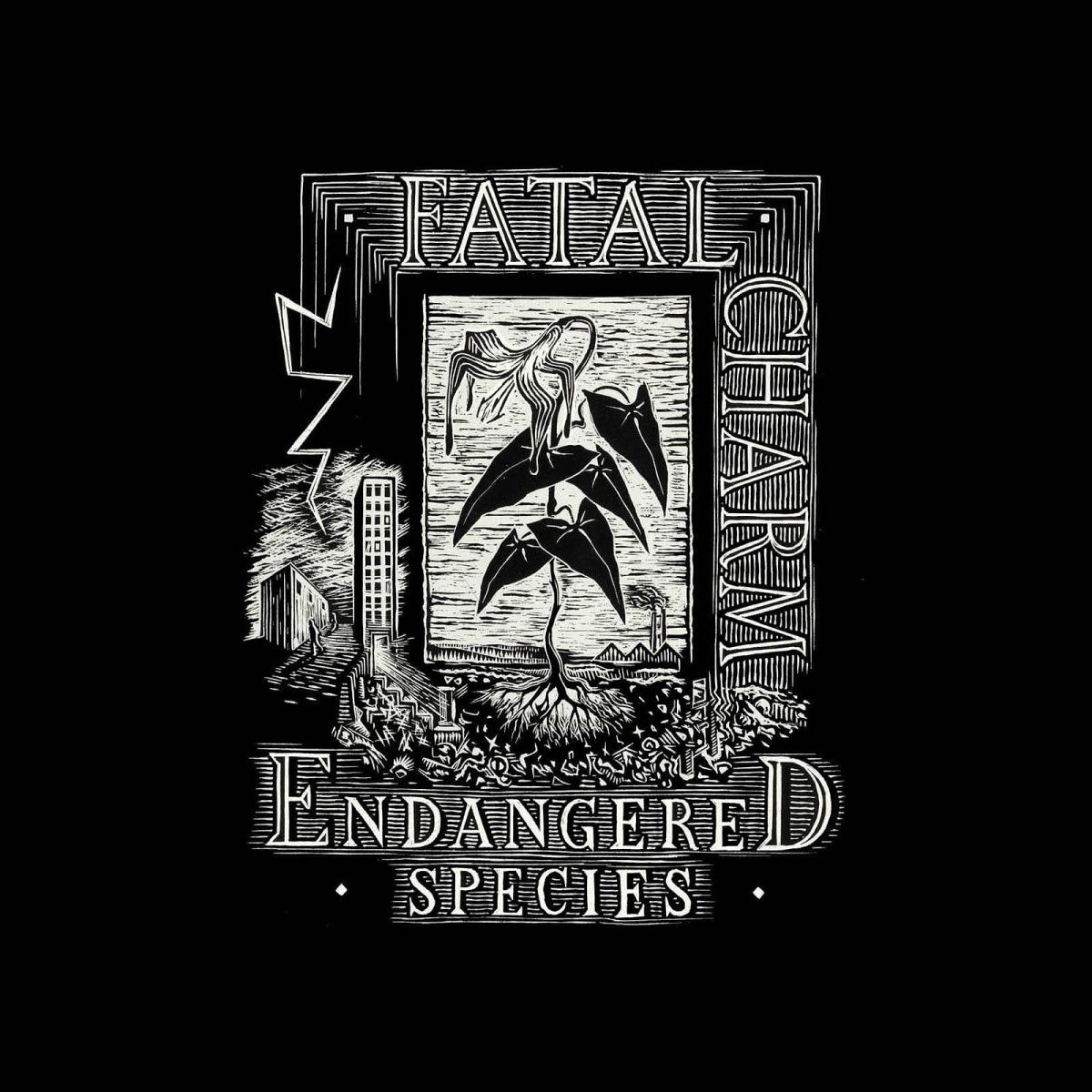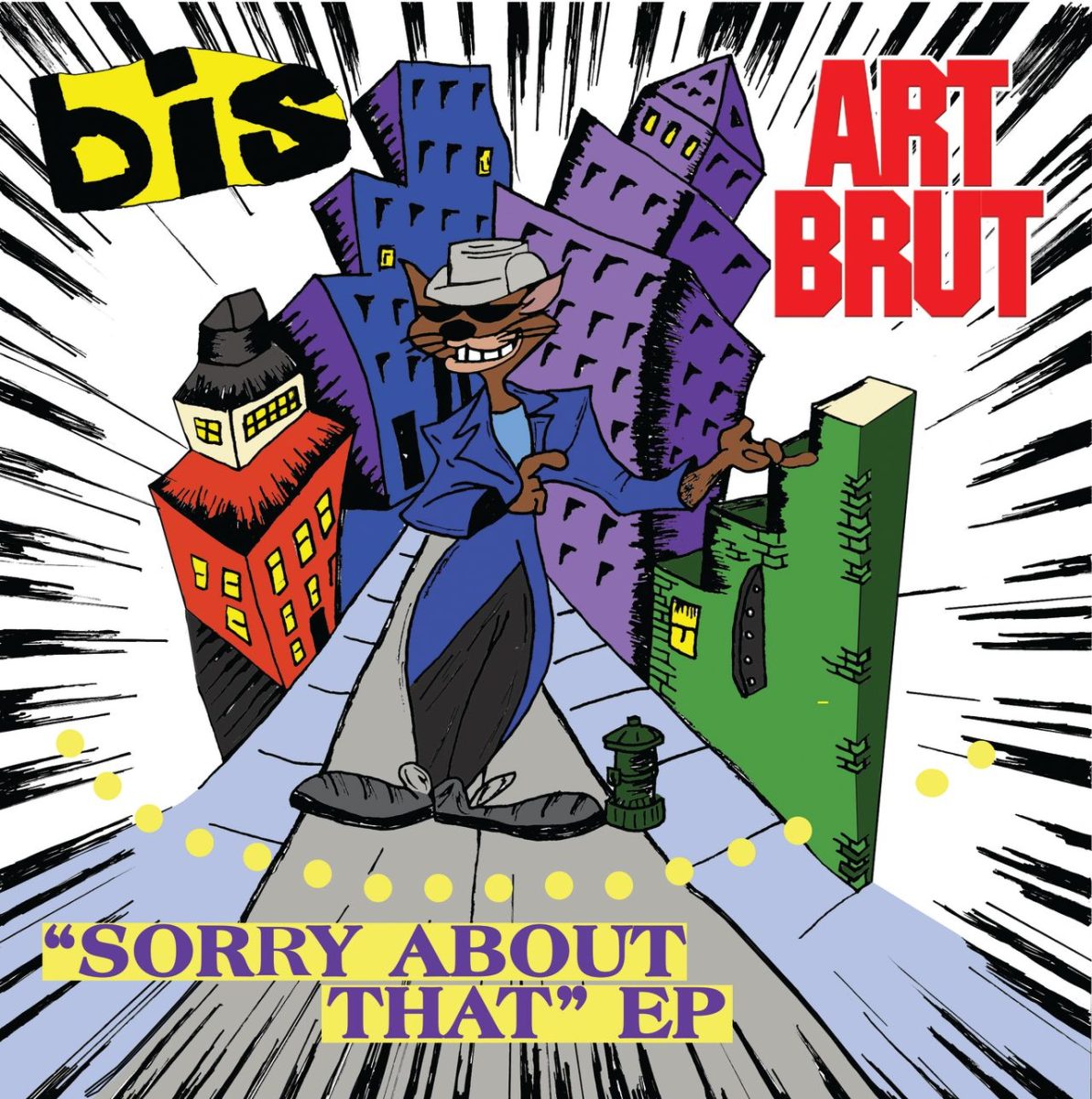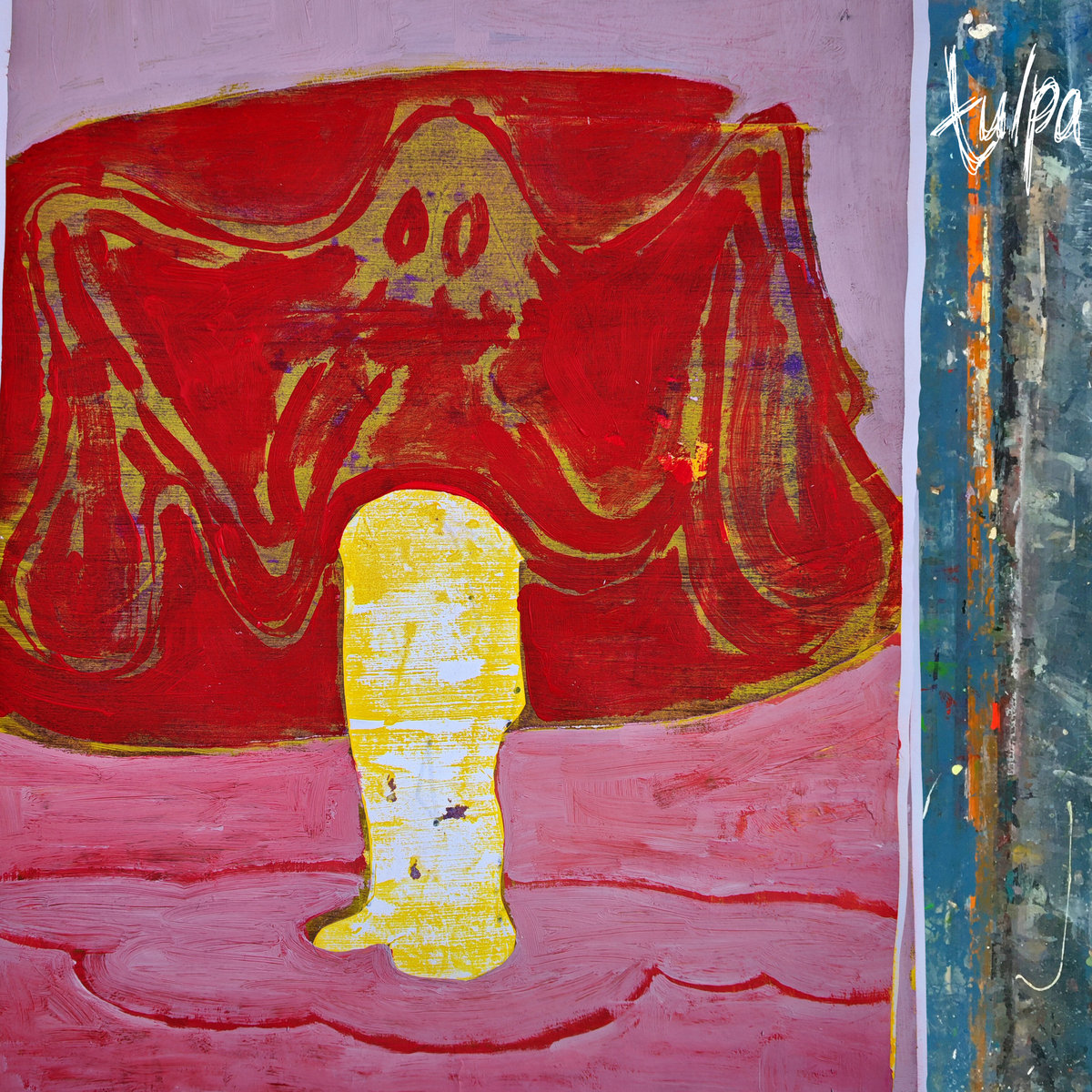In the fifth instalment of this ongoing series, Martin Gray revisits the fine debut album Endangered Species by early-80s Nottingham-based ‘synth pop/ indie rock’ outfit FATAL CHARM and wonders why it was never even a contender for a place among the top 50 best albums of the year. There is simply no justice in pop sometimes.
In 1978, pop music got exciting again. After all the fall out from punk a couple of years previous, there were dozens of really cool new bands all somehow bracketed under a diffusely misleading ‘catch-all’ genre by the name of ‘new wave’. One of them was a combo from Nottingham going under the name of The Fatal Charm, formed initially in 1978 as Fantastic The Feedback by main songwriter and guitarist Paul Arnall and consisting of himself and initially two, then three, others on the usual keys/bass/drums set up.
Gigs and recording sessions were sporadic and tentative, a debut single Paris being released in 1979, but things didn’t really gel until around 1980, when a settled 4-piece line up became established and a second release Western Laughter/Dark Eyes was issued but only as a tour-only flexi-disc to tie in with live dates. The band then subsequently became Fatal Charm (dropping ‘the’ definite article). However, even here things were still in a state of flux and there were further personnel shifts brought on by various mitigating factors such as record contract and label collapses. Later in 1980 another new member Sarah Simmonds joined ranks and became the main keyboardist and vocalist, whilst others moved on, and in turn the line up would eventually be based around this core duo of Arnall and Simmonds for all future releases.
Early 1980s support slots with successful synth acts at the time like Ultravox and Orchestral Manoeuvres In The Dark helped boost the band’s profile. A further single had been released prior to this point – a 1981 re-recording of debut Paris coupled with a new composition Christine. Both were produced by Ultravox’s Midge Ure. By 1983, they got the first substantial exposure on mainstream TV when they appeared on an episode of C4’s The Tube. The band soon gained the attentions of Radio 1 DJs including Andy Peebles, Kid Jensen and Janice Long who playlisted them and invited them to record sessions. The latter loved their 1984 single Summer Spies (their debut release for their new parent label Carrere Records) so much that the band were commissioned to do a jingle for her show based on the song, substituting the sung title for her name! Two further singles – King of Comedy and You Know (You’ll Never Believe) – followed before the debut album Endangered Species finally surfaced in 1985.
Sadly, due to a mixture of either poor marketing or plain bad timing, none of the singles Fatal Charm released had much impact on the charts and this certainly didn’t bode well for the parent album either, itself a consistently strong set of guitar-and-synth-led pop/rock songs which would pre-empt a lot of similar sounding groups who came along in their wake who commercially may have stolen their thunder.
What makes this injustice all the more unfair is the fact that Endangered Species is one hell of a debut album: it’s a belting collection of songs that – despite its all too obvious production values that time-stamp this recording decisively in the mid-80s (well, no shit Sherlock, that was when it was released!) it still sounds ageless and relevant when played today, a full 40 years later. All of this is of course down to the quality and calibre of Paul Arnall’s songwriting and arrangements.
There is shimmering ethereal piano-led synth pop (the exquisite opener Summer Spies, featured here in an extended 6 minute album version with keyboards sounding almost like a cousin of OMD’s Joan Of Arc in places), incendiary guitar rockers (Testify, You Know (You’ll Never Believe), Is It A Dream, the title track), quirky new wave/post punk (Iron Curtain Irony), gorgeous twinkling neon-lit ballads (I Am Calling, Flashes In The Night, Bye Bye), and widescreen indie pop epics (the almost debonair swagger of King Of Comedy), that give the album texture and variety as well as a sustained sense of momentum.
Throughout the album, Sarah Simmonds cool and versatile vocals ride assuredly atop the dense mesh of synths and guitars. She can coo and sigh sensuously one moment (Summer Spies), then assert her power and dominance in another (Testify – where she intones almost intimidatingly: ‘you’re in my hands, no escape / make a run, I’ll grab your throat / no escape for you….’), then try her hand at robotic Lene Lovich/Hazel O’Connor vocal leanings the next (Iron Curtain Irony), before settling on a passable impression of Debbie Harry at her swooning insouciant best (see Flashes In The Night and the ravishingly melancholic and downtempo album closer Bye Bye). The latter song’s intro cross-fades in beautifully from the electrified rock of Is It A Dream and has the key refrain ‘when the madness gets you down, it’s goodbye…’ whilst the keyboards swirl majestically all around her. There is no weak track on this album, needless to say.
Listen to the whole album via this YouTube link:
A Slight Digression. Here’s something rather amusing to relate: I played the album to one of my pals from university once during a time when we shared a flat (1986) in Newcastle upon Tyne, and he actually asked me in all seriousness if it was a new record by Pat Benatar as he ‘really liked the songs’. I can see where he was coming from in some ways because there are points here where there is passing similarity in Sarah’s vocals (especially on the more upfront rockers like Testify and Is It A Dream). However, after some initial derision, I assured him that it was not and it was this (little known at the time) group from Nottingham called Fatal Charm, and advised him to get out there to Volume Records on Ridley Street (ahhhh how much do I miss thee so) and purchase the album for himself. He duly said that he would. As it transpired, it was never known whether he made good on that promise as a few short weeks later – during the Easter break – he’d all but dropped out of his course in BA (Hons) Industrial Design and returned back home to his parents in Sheffield, the bloody flunker!
Big Music is not always a bad thing.
Listening to the record again in full flow now, 40 years on and through appreciably more withered 60 year old ears (sure, I already kissed goodbye to my middle-aged phase long ago), there nevertheless remains just one teeny weeny little issue with the album … and it is this: The EQ-ing of the mix. There is a lot of top end on everything. Make no mistake, the [self] production is very accomplished, but it’s quite shrill and very trebly, and the dynamic separation of the original vinyl album (which is what I have as it was the only format I purchased it on) tends towards much compression where the upfront synths and guitars almost combine and fuse as one. Perhaps the remastered digital version that the band have released since has addressed or corrected this, but I would not know as I do not as yet have that digital version….so maybe I should seek it out and see if there is any difference.
That’s not to say the album’s mix is difficult to listen to – it isn’t. This is just my own particular and very minor niggle. I have in the past been absolutely tortured by examples of overly-compressed CD mixes of albums where there is so much treble that it sounds like my eardrums are being violated by dentists’ drills. One particularly shocking example of such a mix is from – of all bands – Super Furry Animals, and their second album Radiator. Have any of you ever listened to the original 1997 CD version of that? I absolutely adore SFA and I love all their records, and Radiator is a peach of an album but that mix, oh my fucking god, it hurts my ears. The treble is pushed to absolute overload on there. NO exaggerating at all. I have to adjust the slider on my EQ control right down in order to listen to it without my ears bleeding. I mean, the arrangements are shrill by default anyway – what with all the gleefully bonkers analogue fuckery that goes on with a lot of prime SFA stuff …. and then you have Gruff Rhys’s distinctive dulcet Welsh tones of course, but that excessive top end is beyond ridiculous. Listen to Hermann Loves Pauline even before those over-amplified cymbals regularly come crashing in, for example! If you have any cats, then watch their ears swivel right back before they very likely bolt out of the room in total alarm!
Thus, Endangered Species is a loud record in a way – it’s in your face. The mix is suitably vast and imposing but with that often comes a nagging sense of a stifling denseness that makes it hard to pick out individual components. As I said before, the production is impressive and first-rate for sure and yet once I’ve sat through all ten songs played at a fair volume (not cranked up, you understand), my ears are actually ringing! Maybe that is merely testimony to the fact that this is BIG music after all….and sometimes that should not necessarily be considered as a bad thing.
Later Activities and Releases
By 1986, after being dropped by Carrere Records, Fatal Charm were pretty much reduced to a duo of just Arnall and Simmonds, and hooked up with another label, Native, which released two further singles Images of Fire (1986) and Lucille (1987) the former of which was the closest to being a minor hit as it gained Radio 1 airplay. Due to yet more issues with record labels – this time with Native, their second album The Strange Attraction didn’t arrive until 1989, released on their own label imprint Really Great Records (owing a nod to their first releases on the Dead Good Records label) and – again as with their debut – despite favourable critical reception, it failed to make much impact commercially.
At the end of the decade, Arnall and Simmonds put their Fatal Charm incarnation on hold in favour of a new venture forging a more electronic / ambient dance direction and sound, and rebranded themselves as State Of Grace. This project saw recordings issued on a variety of labels such as 3rd Stone, Cheree, Zimbabel and even briefly with major label RCA – the latter in the US only, as a response to their new material gaining wider recognition and interest, as well as a new management deal.
State of Grace continued to release music for much of the 1990s whilst also interrupting their schedule at the mid-way point to issue a retrospective collection of earliest (The) Fatal Charm recordings – chiefly singles dating from 1979 to 1981. By the end of the decade, State Of Grace had released their last album (Sometimes – 1998) and underwent a further few years in hiatus during the first half of the 2000s whilst other projects were pursued. Between 2005-2006, Arnall revisited a clutch of unreleased / unfinished recordings with a view to bringing them up to scratch and putting them out under the collected titles Pop, Lovebrigade and Plastic. However a couple of these were simply vehicles for older archived material and unrealised ideas re-booted into new arrangements and issued under the Fatal Charm name whilst consciously not being intended as a full band project. Fatal Charm would nevertheless regroup as a touring proposition and play a series of live dates during the spring of 2012.
1985 – the ‘Jekyll and Hyde Year’ of music
Among all of those all-too-predictable end of year lists that everybody and their dog was so adept at churning out, what fate, I wonder, befell Fatal Charm? Shall we take a look?
1985 will always be remembered as the year the self-appointed rock aristocracy took over absolutely everything. The cream of the crap, if you like. And the chief instigator of all that was what happened on 13th July that indifferent summer – Live Aid. Some cynics referred to it as ‘the day the music died’. Which is probably resonant only if you’re a John Peel or Janice Long listener who could care less about all the big glitzy overproduced pop and rock that was selling in shitloads helped along by that event.
However, what was so weird about 1985 is that it was a true ‘Jekyll and Hyde’ sort of year: among all the commercial big name stadium filling dross (for example, wasn’t that Simple Minds album overblown and execrable? Plus they even had the fucking gall to steal both THE TITLE AND ALBUM FRONT COVER CONCEPT from Siouxsie And The Banshees’ 1981 singles compilation), there was some incredible stuff that was stirring among the indie / underground. I was beginning to tune into more and more of this sort of music and finally eschewing my previous diet of Radio 1 daytime and hit parade fare as I was fast getting bored of a lot of it.
There were also loads of great albums that were released that did deservedly get plaudits from the music weeklies: Jesus and Mary Chain’s Psychocandy, New Order’s Low-life, The Smiths’ Meat Is Murder, REM’s Fables Of The Reconstruction, Prefab Sprout’s Steve McQueen, Propaganda’s A Secret Wish, The Cure’s The Head On The Door, Husker Du’s New Day Rising, Talking Heads’ Little Creatures, and loads more…. It really was another great year for albums, and yet…..Endangered Species made zilch impact, criminally overlooked, forgotten and trampled under the rush as it were.
As far as I can recall it did not feature in a single end of year list from any of the established music papers or magazines. Well for me it was the 7th best album of 1985 in a top 20 that featured some of the above artists plus a few others that, similarly, were afforded little to no attention from the critics back in the day. I would personally argue that if the whole caboodle to promote the band and album was handled better, it could well have been a chart contender, because the potential lies in the strength of its songs. It remains a sadly missed opportunity, and indeed just another otherwise outstanding debut album lost in the mists of time.
This piece mostly focuses on the Fatal Charm debut album Endangered Species released in 1985. However, a web page put together by the band themselves provides an interesting little potted early history of the group’s formation and its various incarnations and other related acts (with rare unseen pictures, record labels and tour posters). It can be found here.
A further comprehensive article from 2014 featuring a band interview can be found on the excellent electricityclub.co.uk site here.
There is no dedicated Fatal Charm Bandcamp page as yet* but more information about releases from Fatal Charm and also State Of Grace can be accessed via this link. *Their original keyboard player David Barker does however have his own Bandcamp page as he has continued producing music since the mid-1990s under the name Asana and also with fellow recording artist Tim Darbyshire under the Cerulean project.
All words by Martin Gray
Further articles in this series can be found on Martin’s profile
A Plea From Louder Than War
Louder Than War is run by a small but dedicated independent team, and we rely on the small amount of money we generate to keep the site running smoothly. Any money we do get is not lining the pockets of oligarchs or mad-cap billionaires dictating what our journalists are allowed to think and write, or hungry shareholders. We know times are tough, and we want to continue bringing you news on the most interesting releases, the latest gigs and anything else that tickles our fancy. We are not driven by profit, just pure enthusiasm for a scene that each and every one of us is passionate about.
To us, music and culture are eveything, without them, our very souls shrivel and die. We do not charge artists for the exposure we give them and to many, what we do is absolutely vital. Subscribing to one of our paid tiers takes just a minute, and each sign-up makes a huge impact, helping to keep the flame of independent music burning! Please click the button below to help.
John Robb – Editor in Chief






Leave a Reply